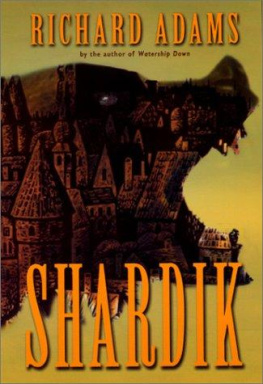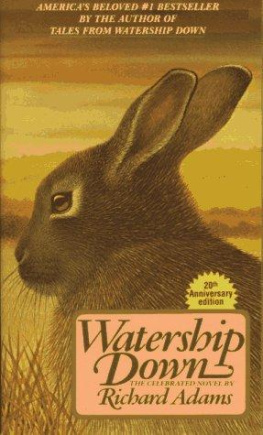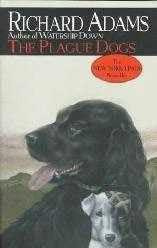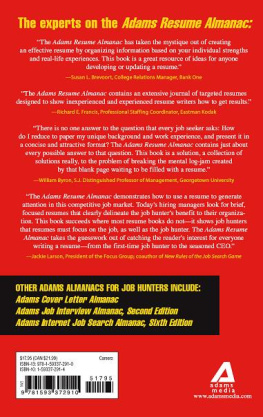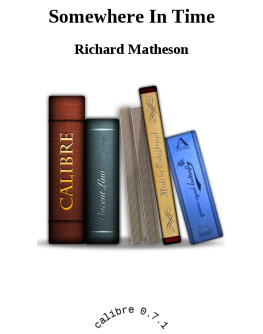PENGUIN BOOKSSHARDIK
Richard Adams was born in Berkshire in 1920, and studied history at Bradfield and Worcester College, Oxford. He served in the Second World War and in 1948 joined the Civil Service. In the mid-sixties he completed his first novel, Watership Down, the story of which he originally told to his children to while away a long car journey. Watership Down was awarded both the Carnegie medal and the Guardian award for children's fiction in 1972.
Early in 1974 he retired from the Civil Service to devote himself entirely to writing, and published Shardik, his second novel. Since then he has collaborated on Nature Through the Seasons (with Max Hooper and David A. Goddard; 1976) and has written the poetry for The Tyger Voyage illustrated by Nicola Bayley (1976). His latest book is The Plague Dogs (1977). He lives on the Isle of Man with his wife Elizabeth, who is an expert on English ceramic history, and his two daughters, Juliet and Rosamond. As well as English literature he is fond of music, chess, beer and shove-ha'penny, bird-song, folk-song and country walking.

Penguin Books Ltd, Harmondsworth, Middlesex, England Penguin Books, 625 Madison Avenue, New York, New York 10022, U.S.A. Penguin Books Australia Ltd, Ringwood, Victoria, Australia Penguin Books Canada Ltd, 2801 John Street, Markham, Ontario, Canada L3R 1B4 Penguin Books (N.Z.) Ltd, 182-190 Wairau Road, Auckland 10, New Zealand
First published by Allen Lane in association with Rex Collings 1974 Published in Penguin Books, 1976 Reprinted 1976 (five times), 1977,197S (twice), 1979
Copyright Richard Adams, 1974 All rights reserved
Made and printed in Great Britain by Richard Clay (The Chaucer Press) Ltd Bungay, .Suffolk Set in Linotype Granjon
Except in the United States of America, this book is sold subject to the condition that it shall not, by way of trade or otherwise, be lent, re-sold, hired out, or otherwise circulated without the publisher's prior consent in any form of binding or cover other than that in which it is published and without a similar condition including this condition being imposed on the subsequent purchaser
To my one-time Ward in Chancery
ALICE PINTO
with sincere affection always.
Contents BOOK I ORTELGA
The Fire 15
The River 18
The Hunter 20
The High Baron 25
To Quiso by Night 37
The Priestess 44
The Ledges 46
The Tuginda 50
The Tuginda's Story 56
The Finding of Shardik 68
Bel-ka-Trazet's Story 78
The Baron's Departure 86
The Singing 89
Lord Kelderek 97
Ta-Kominion 100
The Point and the Causeway 108
BOOK II GELT
The Road to Gelt 117
Rantzay 133
Night Messengers 140
Gel-Ethlin 145
The Passes of Gelt 153
The Cage 162
The Battle of the Foothills 172
BOOK III BEKLA
Elleroth 183
The Green Grove 198
The King of Bekla 210
Zelda's Advice 225
Elleroth Shows His Hand 232
The Fire Festival 239
Elleroth Condemned 246
The Live Coal 251
BOOK IV URTAH: AND KABIN
The Postern 267
The Village 273
The Streels of Urtah 277
Shardik's Prisoner 288
Shardik Gone 292
Lord One-Hand 303
The Streets of Kabin 307
BOOK V ZERAY
Across the Vrako 319
Ruvit 324
The Legend of the Streels 328
The Way to Zeray 333
The Priestess's Tale 341
The Heart's Disclosure 350
In Zeray 356
The Kynat 368
Ankray's News 378
BOOK VI GENSHED
Beyond Lak 387
The Slave-Dealer 394
Radu 412
The Gap of Linsho 415
The Ruined Village 428
Night Talk 433
The Cloven Rock 440
BOOK VII THE POWER OF GOD
Tissarn 459
The Passing of Shardik 466
Elleroth's Dinner Party 481
Siristrou 495
ACKNOWLEDGEMENTS I acknowledge with gratitude the help I have received from my friends Reg. Sones and John Apps, who read the book before publication and made valuable criticisms and suggestions.
The manuscript was typed by Mrs Margaret
Apps and Mrs Barbara Cheeseman.
I thank them warmly for their patience and
accuracy.
The map in this edition is redrawn after a map by Mrs Marilyn Hemmett in the Allen Lane edition of this book.
NOTE
Lest any should suppose that I set my wits to work to invent the cruelties of Genshed, I say here that all lie within my knowledge and some - would they did not - within my experience.
Behold, I will send my messenger ... But who may abide the day of his coming? And who shall stand when he appeareth? For he is like a refiner's fire.
Malachi. Chapter III
Superstition and accident manifest the will of God.
C. G.Jung
Book I
1 The Fire
Even in the dry heat of summer's end, the great forest was never silent. Along the ground - soft, bare soil, twigs and fallen branches, decaying leaves black as ashes - there ran a continuous flow of sound. As a fire burns with a murmur of flames, with the intermittent crack of exploding knots in the logs and the falling and settling of coal, so on the forest floor the hours of dusky light consumed away with rustlings, patterings, sighing and dying of breeze, scuttlings of rodents, snakes, lizards and now and then the padding of some larger animal on the move. Above, the green dusk of creepers and branches formed another realm, inhabited by the monkeys and sloths, by hunting spiders and birds innumerable -creatures passing all their lives high above the ground. Here the noises were louder and harsher - chatterings, sudden cacklings and screams, hollow knockings, bell-like calls and the swish of disturbed leaves and branches. Higher still, in the topmost tiers, where the sunlight fell upon the outer surface of the forest as upon the upper side of an expanse of green clouds, the raucous gloom gave place to a silent brightness, the province of great butterflies flitting across the sprays in a solitude where no eye admired nor any ear caught the minute sounds made by those marvellous wings.
The creatures of the forest floor - like the blind, grotesque fish that dwell in the ocean depths - inhabited, all unaware, the lowest tier of a world extending vertically from shadowless twilight to shadcless, dazzling brilliance. Creeping or scampering upon their furtive ways, they seldom went far and saw little of sun and moon. A thicket of thorn, a maze of burrows among tree-trunks, a slope littered with rocks and stones - such places were almost all that their inhabitants ever knew of the earth where they lived and died. Born there, they survived for a while, coming to know every inch within their narrow bounds. From time to time a few might stray further when prey or forage failed, or more rarely, through the irruption of some uncomprehended force from beyond their daily lives.
Between the trees the air seemed scarcely to move. The heat had thickened it, so that the winged insects sat torpid on the very leaves beneath which crouched the mantis and spider, too drowsy to strike. Along the foot of a tilted, red rock a porcupine came nosing and grubbing. It broke open a tiny shelter of sticks and some meagre, round-cared little creature, all eyes and bony limbs, fled across the stones. The porcupine, ignoring it, was about to devour the beetles scurrying among the sticks when suddenly it paused, raised its head and listened. As it remained motionless a brown, mongoose-like creature broke quickly through the bushes and disappeared down its hole. From further away came a sound of scolding birds.

